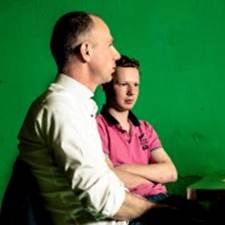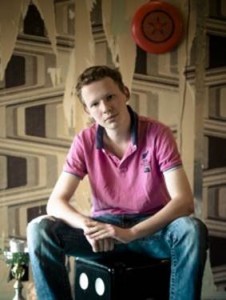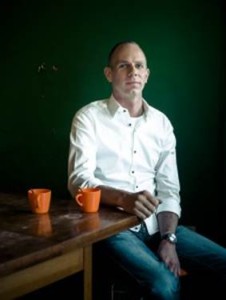Raoul (35) tested positive for HIV in September 1992 and lives near Amsterdam with his husband and two Labrador dogs. Rick (18) lives with three other students in a shared flat in Leiden and tested positive for HIV in November 2012, a good 20 years after Raoul. Gerrit Jan Wielinga from the HIV magazine hello gorgeous spoke to the two about the similarities and differences between them. The interview was published in English translation under the title "Double interview".

RaoulWhen I turned 15, I got a letter from a girl I'd had sex with on holiday. She wrote to me that she was HIV-positive. I then had myself tested and the result was also HIV-positive.
Rick: I came out when I was 12 and have been sexually active since I was 13. I wasn't always careful at first. I didn't just have risky sex, but it took me about a year before I paid more attention to the topic of safer sex. When I was 14, I started getting tested for HIV regularly at our GP, and then twice a year from 16 at the local health centre. It's kind of ironic that I became positive at a time when I was paying a lot of attention.
RaoulI wanted to avoid suddenly being the centre of attention at home and destabilising the whole family, so I didn't tell my parents and brothers until I was 21. At the time, I had no other choice because I had caught a retinal infection.
"My parents thought I would be dead in ten years" (Rick)
RickI told my parents straight away. They were in a total panic and thought I would be dead in ten years. Now it's only my mum who worries all the time. But I gave her all the information she needed. And my eldest sister had already done a presentation on HIV at school, so I was able to talk to her about it calmly and sensibly.
RaoulOf course, getting an HIV-positive test result has an emotional impact. That's why it was important to me at the beginning to gather as much information as possible. But that was back in the pre-internet days and it was much harder to get information than it is today. In the local library, for example, I only found one highly scientific book from the Dutch research organisation TNO. Fortunately, my HIV doctor was a great help. I also received a lot of support from the Dutch HIV Association (HVN), through which I was able to meet people and get information. I then also started volunteering with the HVN and went to schools, for example, to raise awareness there. Later, I founded Jong Positief, a group for younger positive people.

RickI already knew a lot about HIV before my diagnosis. I had positive friends and they had provided me with information. But I also found a lot on the internet and quickly realised where I could get reliable information. Unfortunately, there is a lot of nonsense in many forums, but fortunately many institutions make their data available, so it is quite easy to find scientific articles on the subject. The information for the gay scene was also very helpful. Because I knew so much beforehand, it was easier for me to see HIV in context, even though the diagnosis itself was of course still a shock.
RaoulAt the beginning I found it difficult to keep the diagnosis a secret from my family, but I didn't want to upset the whole situation at home, because everyone would have been worried about me. I also had two younger brothers. But of course I talked to my friends about it, and some of them told their parents, who then wanted to tell my parents. It was quite an act to stop them. Even today, I still think carefully about whether I should tell someone and weigh up what it would do for me and the other person. I know how much it can change a relationship - especially in the days before the introduction of effective medication.
"Even today, I still think carefully about whether I should tell someone and weigh up what it would do for me and the other person" (Raoul)
Rick: When I'm out and about on gay dating portals, I'm amazed at how relaxed people are about safe sex: Hey, let's do it without a condom! I think most people know that it's risky, but they completely underestimate the risk. I'm always open about my HIV status, for me that has to do with honesty and responsibility. I don't take any medication yet and would feel terrible if I infected someone. Of course, there are always people who lose interest when I tell them about my infection, but I have no problem with that and don't take it personally.

Raoul: That sounds familiar to me somehow. Before I met my husband, I was always afraid of infecting someone. That has eased over the years, especially since effective treatments have been available. I think that if you have sex with someone at eye level, then both of you are equally responsible for protecting yourself. If I'm open about HIV, I'm fine. But I don't worry much about that nowadays anyway because I can't infect anyone as long as my viral load is below the detection limit. I'm more concerned about the long-term consequences of the treatment. It's extremely difficult to make reliable predictions about this. At the moment, we simply don't know enough to be able to say whether someone would have had a heart attack or developed a certain type of cancer without HIV. Quality-assured information therefore remains important.
RickI don't have any clear ideas about my future yet, just a few plans, but nothing concrete. At the moment I'm studying Dutch in Leiden and composition at the Amsterdam Conservatory. My favourite thing would be to go public with my compositions and get people interested in music. Incidentally, music and sex have a lot in common: to play the clarinet, for example, you need exactly the right lip tension. (grins) At the moment I like being single, but later I would like to find love, however that might happen.
RaoulMy perspective on the future is strongly influenced by the time when I was infected. Back then, the diagnosis was a death sentence. Since then, I have lived my life day by day. Today I am married, pay into a pension scheme and have bought a house with my husband, but beyond that I don't plan too far ahead. As long as I like my job, I'm fine [Raoul works for a small international NGO that deals with drug resistance; Leo Schenk]. In addition to my work, my voluntary work at the Marieke Bevelander Huis foundation is also important to me. Here, HIV-positive people can talk to other positive people. Many people with HIV would like to talk to others in a similar situation without having to explain all sorts of things beforehand, but they don't know who to turn to. By the way, I have to go now because I have an appointment with someone there straight away.
RickAnd I have to go to the conservatory because I'm helping out at the Composers' Festival Amsterdam. Thanks for the coffee!
Many thanks to editor Leo Schenk, Gerrit Jan Wielinga and Henri Blommers for their permission to publish.
(Photos: Henri Blommers, translation of the English version: Holger Sweers.)









